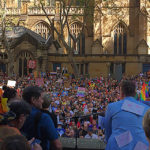Police Mishandling of the Bowraville Murders

Over a period of five months between 1990 and 1991, three Aboriginal children disappeared from the same street in a housing mission near the NSW town of Bowraville.
The bodies of 16-year-old Clinton Speedy Duroux and four-year-old Evelyn Greenup were later found in bushland with head injuries that indicated that they had both been beaten with a blunt instrument.
16-year-old Colleen Walker’s body was never discovered, although her clothes were later found weighed down with rocks in a river that was fairly close to the location of the other bodies.
The ABC’s Four Corners program reported that at the various times when the three children went missing, their families reported their disappearances to the local police.
The police responded to two of the reports, saying that the children had probably just gone “walkabout”. Even after weeks had passed, police saw no connection between the missing children, and in fact sent in the Child Mistreatment Unit to investigate their families, suspecting them of child abuse.
When the bodies of Clinton and Evelyn were discovered, police conducted a homicide investigation, although no specialist homicide investigators were sent. The investigation was conducted by police who were already at Bowraville.
Problems with the investigation
The police investigation left a lot to be desired. Although there was only one suspect who lived in a caravan, it was a full 10 days after Clinton’s body was found before police seized the caravan to examine it for evidence.
Only a single tiny drop of blood was found in the caravan – so small that it could only be identified as human blood. The suspect was also allowed to keep some barbells that may have been used as the murder weapon – forensic examiners never got to examine them.
Despite these problems, the suspect was charged with the murders of Clinton and Evelyn, but the prosecution relied entirely on sketchy circumstantial evidence.
Matters separated
Regardless of their similar factual circumstances, the cases were not heard together.
Having the cases heard together would have highlighted the similar locations and manner in which the bodies were dumped, the similar head injuries sustained by both victims, and the weight of witness evidence that could show how the accused had conducted himself generally and on the evenings when the victims disappeared.
The jury didn’t hear the key evidence that linked the cases. This weakened the prosecution’s cases significantly and as a result, the accused was acquitted of Clinton’s murder, and the charges against him for Evelyn’s murder were dropped.
But following a coronial inquest in 2004, the accused was again charged with Evelyn’s murder.
The officers who had at that point had spent 10 years investigating the matter weren’t called to give evidence, which was just one of the issues with the trial. The accused was found not guilty.
Double jeopardy legislation in NSW
These legal processes were taking place against a backdrop of double jeopardy legislation in NSW.
In essence, double jeopardy says that a person cannot be tried twice for the same crime. In other words, once the suspect was acquitted of the murders of Clinton and Evelyn, that was the end of the legal line. He would not have to face trial again for those murders.
Then in 2006, changes were made to the double jeopardy laws, providing that if “fresh and compelling evidence” had been found, there could be a retrial of any person acquitted of a very serious offence, including murder.
This was big news for the families of the victims. New evidence was indeed found, including witnesses who could allegedly place the suspect in the vicinity of all three victims on the nights they had disappeared.
Armed with this fresh evidence, the families approached two subsequent Attorneys-General to have the matters retried together. Their requests were refused.
But things didn’t stop there. The families then lobbied the NSW Government, leading to a parliamentary inquiry into the murders and how the investigation was mishandled.
Parliamentary inquiry recommends further change to law
The inquiry was held in 2014. One of the key people addressing the inquiry was Detective Inspector Gary Jubelin, who has worked on the case for more than two decades.
He compared the trials to that of Ivan Milat, one of Australia’s worst serial killers, saying that “if Ivan Milat’s trials were separated, there is a strong likelihood that he would have been acquitted of all offences and perhaps [be] walking the streets.”
The inquiry has now wrapped up and one of its key recommendations is that the double jeopardy legislation be changed to allow the cases to be tried again, this time together.
Since then, NSW Attorney-General Gabrielle Upton has indicated that a review of the double jeopardy laws is underway, and all other recommendations will be adopted.
There is a feeling that these cases may yet again go to trial. If the matters are tried together, there is a greater chance that all the relevant evidence will be considered by judge and jury.
Wider implications
The review of the legislation may have implications for other cases as well; with the potential to reopen cases against those who have been acquitted of serious crimes.
Regardless of the changes, it is important for anyone facing the prospect of serious criminal charges to seek advice from experienced criminal defence lawyers.






